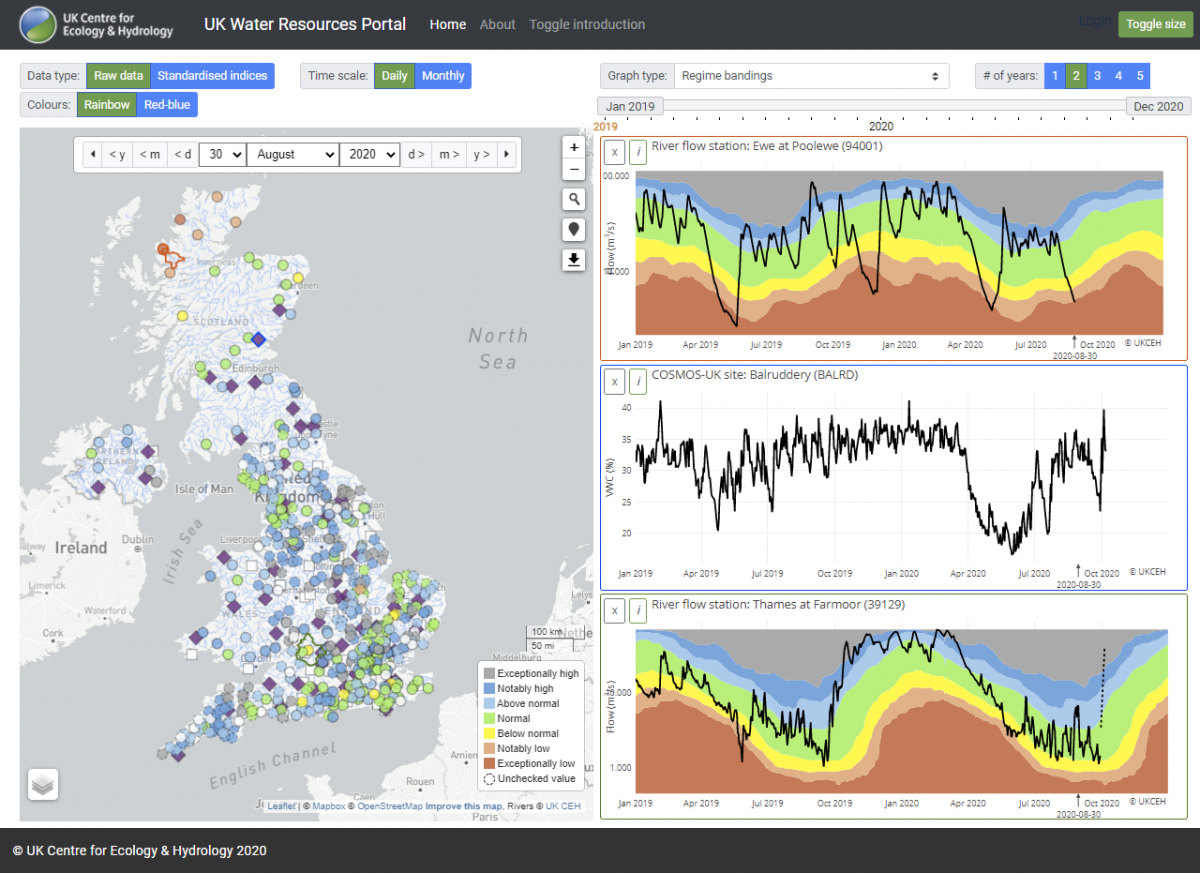Drought in Scotland
“It’s a common perception that drought doesn’t have an impact in Scotland, you see much a worse impact in other parts of the world, but it is all relative. In fact, drought is an issue for us with a widespread and big impact. That is something we had already been trying to communicate and summer 2018 helped to get the message home.”
Steve McGuire, Senior Scientist in Water Resources, Scottish Environment Protection Agency (SEPA)
From improved communications to more accurate monitoring, in 2018 the Scottish Environment Protection Agency (SEPA) went into North East Scotland’s most prolonged period of water scarcity in decades better equipped, thanks to About Drought.
New contacts also mean that SEPA’s Water Scarcity Team are able to build more Scotland-specific data and research into their new strategies.
Two consecutive dry winters, low summer rainfall, higher than average temperatures and a period of soil moisture deficit that stretched a month longer than in 1976, caused impacts across the region in summer 2018. Steve McGuire had already been involved with the research programme representing SEPA, a key stakeholder, for several years and presented at About Drought’s Drought & Water Scarcity Conference in Oxford in March 2019 about how Scotland’s National Water Scarcity Plan was implemented in summer 2018 – its first major test.
Drought is an issue in Scotland – whisky production stopped
He says: “It’s a common perception that drought doesn’t have an impact in Scotland, you see much worse impact in other parts of the world, but it is all relative. In fact, drought is an issue for us with a widespread and big impact. That is something we had already been trying to communicate and summer 2018 helped to get the message home.”
That impact affected fish stocks and crops and included halting whisky production, and with a relatively high proportion of private water supplies in some regions, these crucial issues led to the Scottish Government bolstering supplies with water in tankers in some areas. Steve says: “Many of the private water supplies are not robust enough to deal with an extreme event – they are often from shallow groundwater or springs – we are working together with the Scottish Government and Scotland’s Centre of Expertise for Waters to look at improving the existing private supplies.”
Impact of water scarcity on timber industry
The Oxford conference, attended by 150 water experts, stakeholders, regulators and researchers, was a valuable opportunity for Steve and a small group of Water Scarcity Team colleagues to extend their contacts around the UK as well as internationally, and find out how water resources are managed in other countries. Those included a key connection with Forestry Commission research presented by Susan Davies of the University of Edinburgh, discussing drought-resilient tree species.
Steve says: “It was the first time we had heard that anyone was looking at that for the Scottish Timber Industry, at the same time we had also started to look at water resources, policy and ecology plans for the different sectors in Scotland and we have been able to feed Susan’s research into those plans.”
Steve had also joined one of DRY’s very popular regional community workshops, held in the Eden Catchment in Fife.
“It definitely shaped how we produce our reports and ways to get the right message across, making people aware that water scarcity is an issue in Scotland, which helped us in the summer of 2018. It brought different people around the same table – Scottish Water, government, local farmers … groups like that were really good for getting other people’s points of view that we may not always see.”
About Drought’s Edinburgh workshop
Then in May 2019 About Drought held a workshop for SEPA and Scottish Water in Edinburgh which enabled a wider audience to discuss the programme’s outputs first-hand. Steve explains: “That was great because it meant we could get more people from SEPA to come along and the focus was on Scottish issues – it is useful to make use of experiences elsewhere and ensure we are following consistent approaches with other agencies, but there are also cases where a Scotland-specific approach is required.”
As a result of that meeting, SEPA identified where it can feed improved data from its monitoring network into the UK Drought Portal and, in turn, draw from it near real-time data to better monitor and communicate situational updates. In the future it is leading to a collaboration, developing a forecast system providing advanced, accurate warnings of when water scarcity is developing.
Combining resources, data and effort
“We are speaking to CEH about combining our resources, data and effort to feed our live data into the Drought Portal and we envisage being able to use the tool with our own reporting which would be a significant step forward,” says Steve.
SEPA are using About Drought’s communications research to inform future messaging for different audiences, like pre-warning private supply holders of potential impacts of water scarcity and the need to protect the environment.
Inspired by innovative communications project
SEPA were inspired by the innovative work by students from Falmouth University’s School of Communication Design on how to get water-saving messages across to hard-to-reach Millennials by About Drought’s social science co-ordinator, Dr Rebecca Pearce.
With humorous video clips, posters and social media posts the students devised effective peer-to-peer campaigns. Steve explains: “It was really interesting to see their ideas, it’s a relatively new area to us. We really liked the ideas they had.
“This wider and better understanding that we have from About Drought means we can develop ways to get our information out there and, importantly, to get a general understanding that water scarcity is becoming more of an issue in the future due to climate change. “It is something everyone needs to think about and everyone can have an impact.”
Interview by Sally Stevens
Posted October 2019

